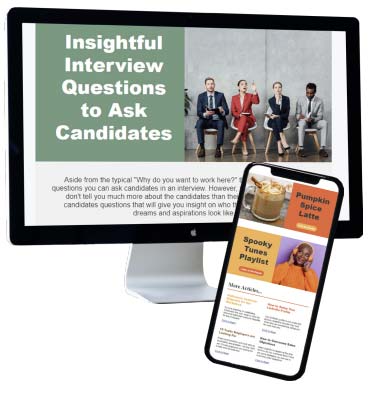Before You Go!
Sign up for our newsletter - which features professional templates, job market updates, articles, playlists, recipes, and more, sent directly to your inbox!



If you’re here, then you’re probably wondering (for the twentieth time), “Why didn’t I get the interview?” Whether you’re just getting started on your career path or are seeking a new opportunity, reaching the interview stage in the application process is an increasingly difficult task. It’s especially frustrating when you feel like you were the perfect fit for the position! So why didn’t you land the interview?
With almost two decades of recruiting experience, the experts at JWilliams Staffing put our heads together to outline the primary reasons we choose not to contact a job applicant. The result is a list of some possible reasons why you didn’t get the interview. We hope you can use this knowledge to land your next interview, so let’s get to it!
Have you been applying for every available job opening you can find without evaluating if the position is a good fit for you, or catering your resume (or cover letter) to those positions? Then you may not be getting any calls because you’re “shotgunning” your resume. Yes, that’s right. Employers and recruiters can tell when you’re just taking a generic resume and applying to multiple positions at once.
Our Maintenance Services Director, Juan Vasquez, shared, “One of the biggest pitfalls of shotgunning a resume is that the skills and accomplishments you list aren’t catered to the job to which you’re applying. Every position (including those with the same job title) will have different requirements. Evaluate those requirements, determine if you’re a good fit, and then ensure your resume highlights how you’re a strong match.” Applying with a generic resume might be easier, but it will often leave you without an interview.

Applying for a position with an outdated resume sends a red flag to the recruiter. Not only does it show carelessness, but it also provides little useful information to the hiring manager. “When applying for a position, make sure to include your dates of employment, update your present experience, and update your location if you have moved. It seems simple, but we do get resumes that aren’t up to date, and we can’t do much with that information,” shared NorCal Regional Manager, Thomas Horton. You don’t want to send a resume that says you live in Oregon when you actually live in California, and the position you’re applying for is in California. So do a full check and update of your resume when you begin applying to job openings.
Suppose you live in a different county, more than X miles away, or are in a different state than the positions to which you are applying. If any of these situations apply to you, where you live may be preventing hiring managers from interviewing you. Unless the position is remote, or the ad mentions a “relocation allowance” (compensation to cover the cost of moving), many employers will decide not to interview you because you do not live close by.
However, we are not implying that your location should stop you from applying. Instead, use your cover letter to let the employer know that you have plans to move or are willing to relocate for the position. Just understand, your resume may still be overlooked until you’ve actually made the move. This is especially true for lower-level or entry-level jobs.
For advice on including your intent to relocate in your cover letter, read this article from The Balance Careers.
Recruiters and hiring managers have to sort through hundreds of resumes. They need to identify your top skills and accomplishments quickly, so applying with a resume that’s longer than two pages is a surefire way to get it immediately tossed. “I’ve seen resumes come in that are as long as six pages,” shared NorCal Multi-Family Senior Regional Manager, Marlo Brooks, “That’s just too long. Hiring managers don’t need to see every task you performed in every single role you’ve held. We want to see the quantifiable contributions you made while in each relevant role. The best resumes are comprehensive but concise.” A resume that is too short is also a bad thing, so make sure yours includes all of your relevant experience, but keep it to bullet points that are easy to digest.
For more tips on the perfect resume length, check out this article on Indeed

Did you check, double-check, and then have a family member or friend (or two) check and double-check your resume for errors? If you haven’t done this, there may be spelling or grammatical errors in your resume that cause recruiters to put your resume in the “no” file.
“In most cases, your resume is how you’ll make your first impression with an employer. If that first impression is riddled with grammatical errors or typos, a hiring manager may assume that you lack strong writing skills, attention to detail, or both,” said Bay Area Regional Manager, Mike Bocchicchio. Double-check your resume for errors with spellcheck and proof-read it several times to ensure there are no errors. It also helps to get a second or third pair of eyes on your resume. Have a trusted colleague or friend review your resume before submitting it.
Our National Senior Recruiter, Lauren Beardsley, said, “Almost every employer I work with wants to see the LinkedIn profile of the candidate we’re presenting them. While it’s not absolutely necessary to have a link to your LinkedIn profile on your resume, it is an excellent idea as you’re saving the employer time by giving them what they’re looking for upfront instead of making them hunt for it.”
You may also choose to link to your online portfolio, professional website, or other relevant sites if applicable. Links should be placed either in your resume header or in the contact information section of your resume. Once you have added all of the necessary links, click on them yourself to ensure they work before submitting your application. You don’t want to ruin your chances at landing an interview by accidentally sharing a broken or incorrect link. For more help, The Muse has an incredibly helpful article on how to include links in your resume.
Some positions might be looking for very specific experience and qualifications that you do not have. But that’s okay! If this is a specific position you want, the best thing to do is learn which qualifications you don’t meet and work on getting those qualifications so you can reapply in the future. Start by looking carefully at the job requirements and ask yourself how closely you meet those requirements. As you measure the gap between the requirements and your resume, consider whether you have what it takes to do the job well. If you have many of the necessary skills for the position, you can address the cross-application in your cover letter and an eagerness to take on new tasks. If you notice a significant skill or experience gap, then landing that interview will be more difficult. In this case, you might want to look into a more entry-level position in order to gain the necessary skills or experience for your desired job.

If you have a gap in your work history, don’t try to hide it. Unexplained job gaps can raise a question, but only if they are unexplained. “Use your resume or a cover letter to help the recruiter understand job gaps. Having an explanation for why you’re missing a year or more of work experience helps the employer see that you aren’t trying to hide anything,” explained SoCal Multi-Family Regional Manager, Brandon Holland.
We recommend you address job gaps within the format of your resume as well as a cover letter. For example, if you took time away from the workforce to raise your children, write a brief paragraph cover letter that states just that and then moves on to your qualifications and motivations for the role. Then, state that you were raising your children on your resume in the chronological spot where the “gap” would be within your list of experience.
Have you held a couple different positions within the last year or appear to have changed jobs once a year for the past few years? Then to an employer, it might look like you have been job hopping. If left unexplained, frequent changes in your work history can send the wrong message, preventing you from getting an interview.
The way you handle this depends a little more on the circumstance. It is not uncommon to take temporary or contracted roles that last a few months to a year. Employers understand this, so be sure to indicate the nature of the position on your resume. If you did “job hop” for a bit, meaning you left a handful of jobs with around just a year employment or less at each, use your cover letter to give brief but sound reasoning on why you made some quick transitions. Explaining job-hopping effectively can be delicate, so if you need to do so, check out this article on careersidekick.com.
According to a survey by CareerBuilder, 70% of employers “use social media to screen candidates before hiring”. This means that if you have an unprofessional social media presence, you’re putting yourself at risk of not getting the interview. According to the same study, 54% of all employers have found content on an applicant’s social media that “caused them not to hire a candidate”. Don’t take your chances! Our guide on social media and professionalism is the best way to make your social media profiles more professional and help you land that interview.

Some employers prefer to hire a familiar candidate. This might mean they promoted a current employee, hired a referral from an employee, or hired someone who provided temporary assistance.
A great way to get your foot in the door with an employer is to take temporary assignments with a staffing agency such as JWilliams Staffing. Working with a temporary staffing agency helps you gain hands-on experience, allows you to build an outstanding reputation with various companies, and connects you with a recruitment team who provides you valuable feedback and educational resources while promoting you to their clients.
Many of our candidates have been hired by our clients because they go above and beyond while providing temporary assistance. The lasting impression they make while temping puts their name at the top of the list when a full-time position opens up at that company. They get the interview, and then they get the job.
